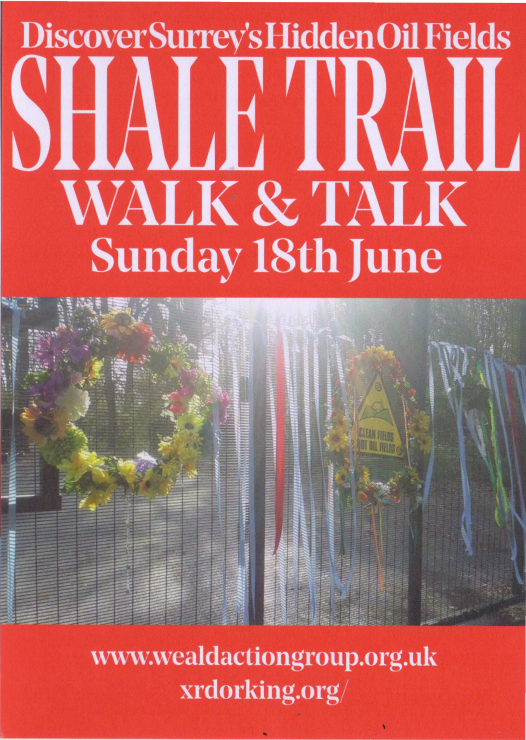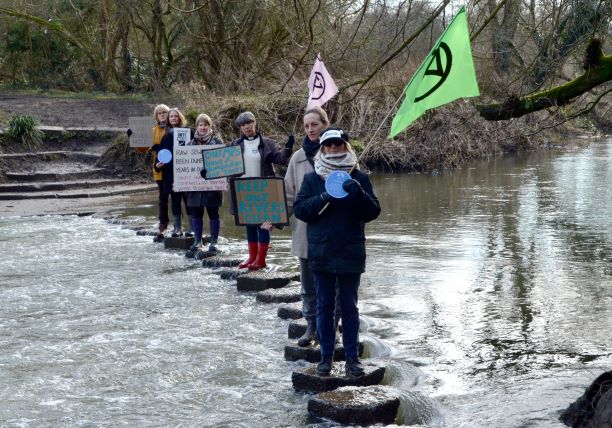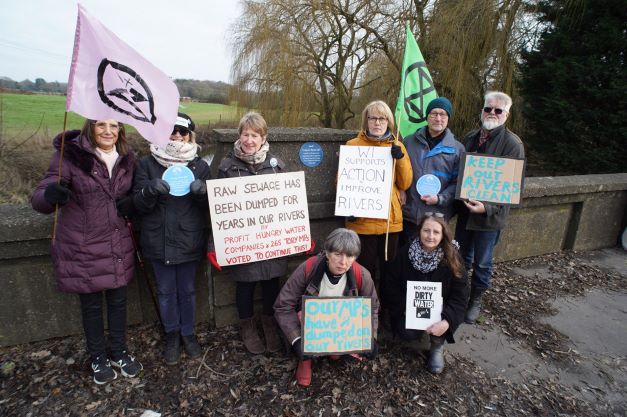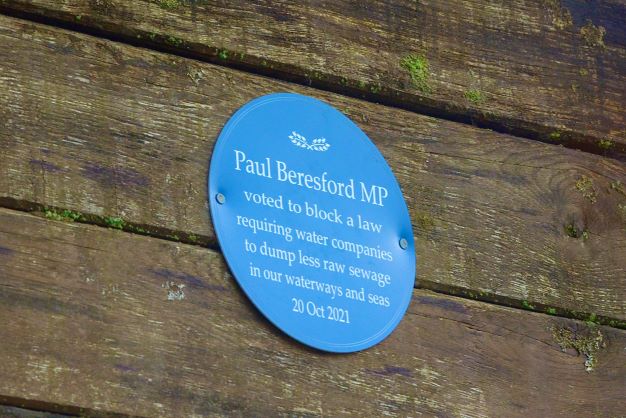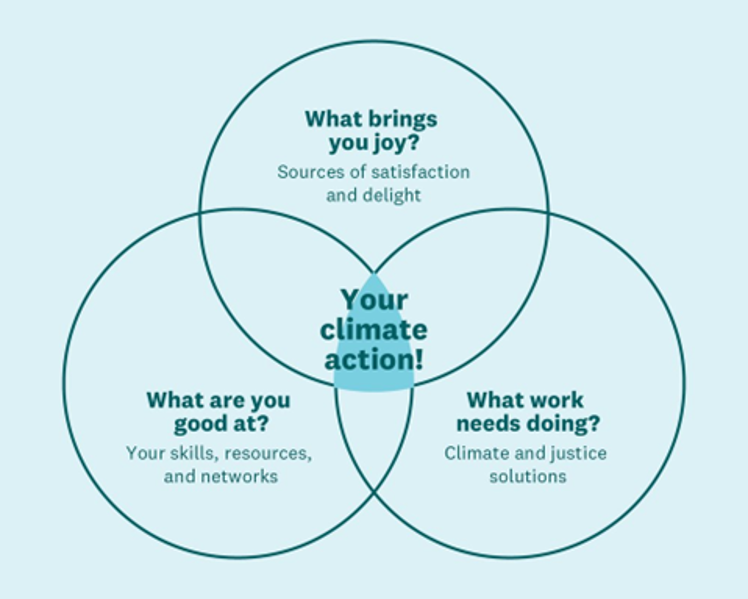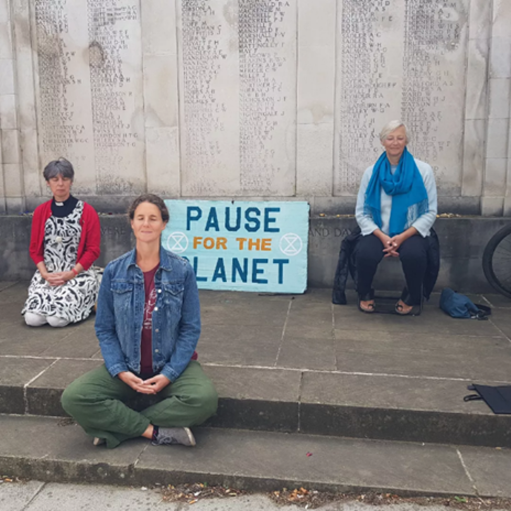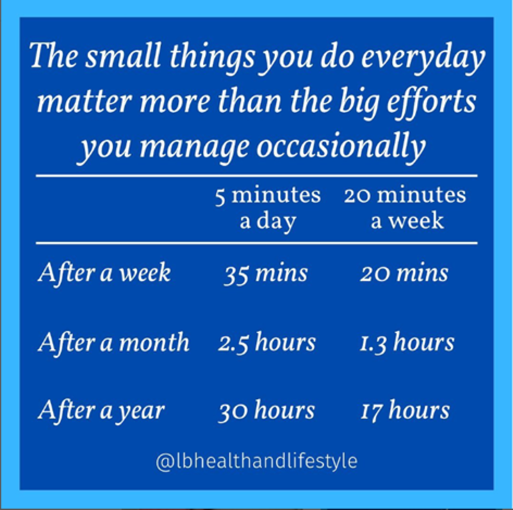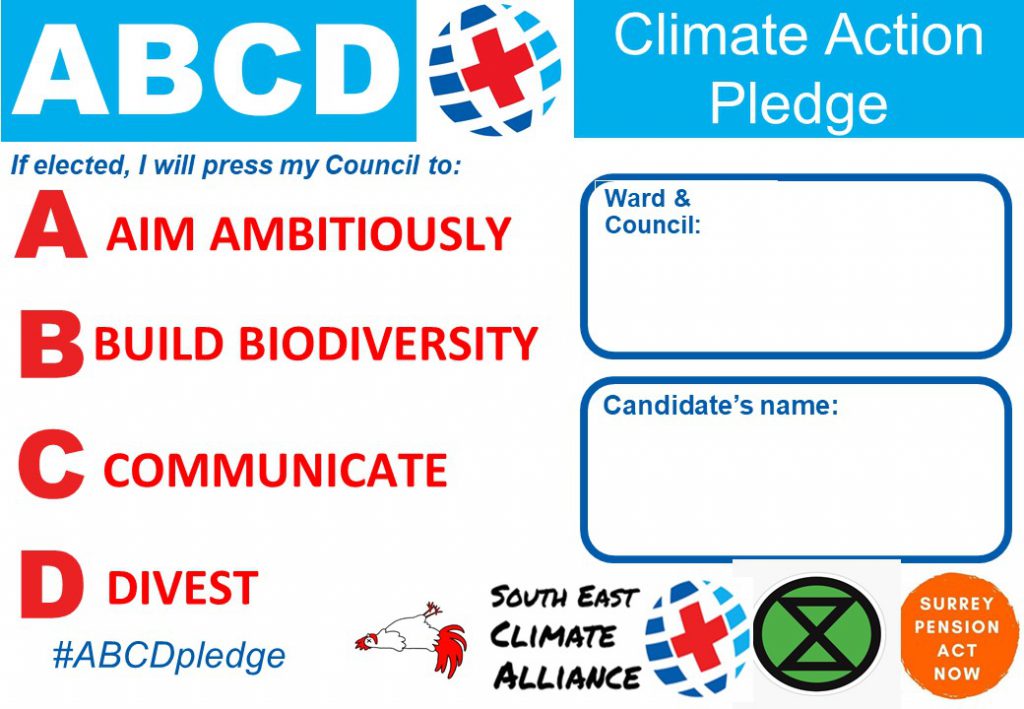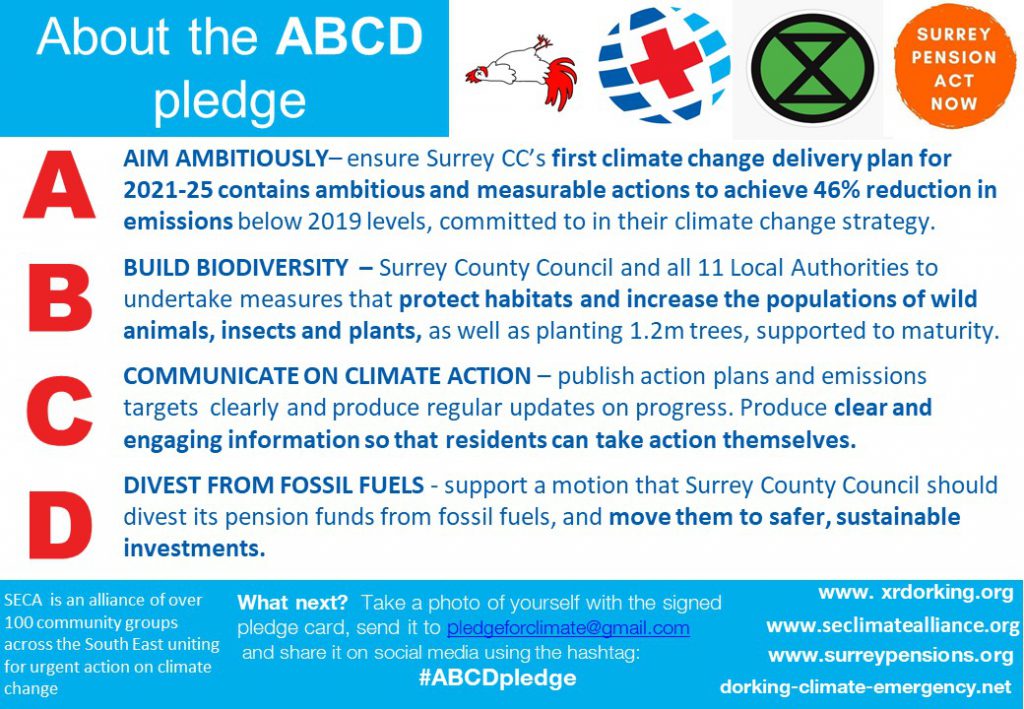Oil firm continues to pump oil from Horse Hill site, while Surrey County Council turns blind eye, despite planning consent being quashed by Supreme Court in June
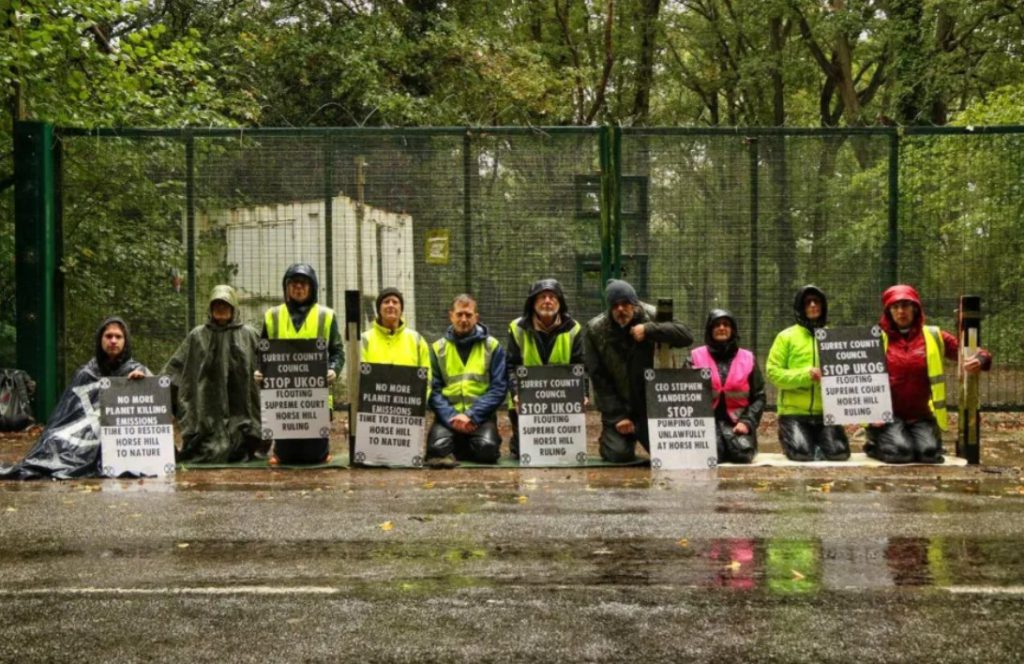
On Monday, ten Extinction Rebellion campaigners are blocking the entrance to the UK Oil & Gas Horse Hill oil extraction site in Horley, Surrey, near Gatwick Airport, to protest the company’s continued extraction of fossil fuels at the site in blatant contravention of a landmark Supreme Court ruling made earlier this year.
UK Oil & Gas (UKOG) has not had planning permission to extract fossil fuels from the site since the Supreme Court decided to quash planning consent for the Horse Hill site in June this year.
However, four months on Surrey County Council has yet to enforce the Supreme Court ruling, despite knowing UKOG is ignoring the ruling and continuing to extract oil from the site.
The protestors have pledged to stop any vehicles from entering the site. They are holding placards stating “Surrey County Council, stop UKOG flouting Supreme Court Horse Hill ruling”, “CEO Stephen Sanderson Stop Pumping Oil Unlawfully At Horse Hill” and “No More Planet Killing Emissions – Time To Restore Horse Hill To Nature”.
The Supreme Court case, brought by Extinction Rebellion climate activist Sarah Finch, on behalf of the Weald Action Group, centred around Surrey County Council’s 2019 decision to grant UKOG planning permission to drill for up to 3.3 million tonnes of crude oil for 20 years at its Horse Hill site, near Gatwick Airport. [1]
Finch argued that under the correct interpretation of the Environmental Impact Assessment (EIA) Regulations 2017 environmental impact assessments must take into account downstream emissions caused by burning extracted oil.
She took her fight to the Supreme Court after three appeal court judges were split over the lawfulness of the county council’s decision to grant permission for 20 years of oil drilling and production and she won.
The landmark Supreme Court judgement clarifies that planners must consider the effects of burning the fossil fuel produced before granting planning permission for its production – which did not happen at Horse Hill.
The ruling has sent shock waves across the industry and has led to a number of other planning applications being quashed around the UK [2] alongside Horse Hill’s and is now threatening the major North Sea projects Rosebank and Jackdaw [3], leading the Times to declare: “The words ‘Finch ruling’ now invoke dread in oil, coal and gas company boardrooms” [4].
Not so, it seems, at UKOG, owners of Horse Hill Developments Ltd, where the Supreme Court decision has effectively been ignored as they continue to produce oil unlawfully from HH-1 at Horse Hill, the company’s only producing well[5].
Protestor Deborah Elliott from Reigate, which is two miles from the site, said: “It’s shocking that UKOG had no plan to cease production if they lost their planning permission, which was the inevitable consequence of the Weald Action Group’s win. I believe this shows UKOG’s contempt for the Supreme Court and its decision.”
The legal case was brought against Surrey County Council, the local authority who granted planning permission in September 2019, just nine weeks after it declared a Climate Emergency [6].
Surrey County Council is well aware that UKOG is operating without planning permission, but appears reluctant to enforce the Supreme Court judgement by putting a stop on the works at Horse Hill [7].
James Knapp, a father of three from Dorking, who is also taking part in the demonstration, said: “Stephen Sanderson, CEO of failing oil company UKOG, is making Surrey County Council look weak and ineffectual in the face of blatantly unlawful oil extraction. The site has been plagued by incidents in its short history including a rig fire [8], local residents and grazing horses affected by noxious fumes, hundreds of thousands of pounds worth of damage from the earthquake swarm which coincided with oil workers returning to the site[9], and a fine from the Health and Safety Executive for irregularities which left the oil well vulnerable in blow out situations [10].”
Another protestor, Extinction Rebellion campaigner Jackie Macey, 69, a retired teacher, said: “It’s really quite simple. Surrey County Council need to tell Mr Sanderson to stop all activity at Horse Hill until UKOG have planning permission. They will be enforcing a Supreme Court judgement and no reasonable person could possibly criticise them for that, so I urge them now to do what they should have done as soon as the Supreme Court decision was handed down; instruct them to stop the works now. If Mr Sanderson then continues to flout the law he would be liable to criminal prosecution. If a new planning application does ever arrive from UKOG, we will be making the case that the site should be restored to nature, enough is enough!”
Reverend Helen Burnett, a Parish priest who lives within five miles of Horse Hill is also protesting at the gates of the site. She said: “The Supreme Court decision was a beacon of light in a world of dire climate news. With UK crop yields plummeting, flooding at scale on every continent, droughts, intense hurricanes supercharged by a hotter sea, one after the other. This new normal isn’t static, it will get worse as we continue to burn more fossil fuels. I urge Surrey’s Officers and Councillors to respect the Supreme Court decision, and order UKOG to stop work at Horse Hill immediately.”
Notes to Editors
[1] https://www.supremecourt.uk/cases/uksc-2022-0064.html
https://www.bbc.co.uk/news/articles/cm2979zg0d0o?
[3] https://drillordrop.com/2024/08/29/sarah-finch-judgement-impacts-north-sea-oil-and-gas/
[4] https://www.thetimes.com/uk/environment/article/sarah-finch-activist-fossil-fuels-oil-gas-glb2s7qqh
[5] https://drillordrop.com/2024/10/02/supreme-court-oil-site-operates-without-permission/
[6] https://drillordrop.com/2019/07/09/surrey-declares-climate-emergency-as-campaigners-stage-die-in/
[7] https://surreycc.public-i.tv/core/portal/webcast_interactive/903159/start_time/2349000
At 56.30 Cllr Ernest Mallett brings up the question of issuing a stop order on the Horse Hill works and Planning Development Officer Sian Saadeh replies.
[8] https://drillordrop.com/2019/11/03/fire-at-horse-hill-oil-site/
[10] https://drillordrop.com/2019/06/21/gatwick-gusher-broke-safety-laws-over-blowout-preventer/
About Extinction Rebellion
Extinction Rebellion (XR) is a decentralised, international and politically non-partisan movement using nonviolent direct action and civil disobedience to persuade governments to act justly on the Climate and Ecological Emergency.
Donate | Support our work
What Emergency? | Read about the true scale of the climate crisis
Why Citizens’ Assemblies? | Breaking the political deadlock
XR UK Local Groups | View a map of all local groups
XR UK website | Find out more about XR UK
XR Global website | Discover what’s going on in XR around the globe
Time has almost entirely run out to address the climate and ecological crisis which is upon us, including the sixth mass species extinction, global pollution, and increasingly rapid climate change. If urgent and radical action isn’t taken, we’re heading towards 4˚C warming, leading to societal collapse and mass loss of life. The younger generation, racially marginalised communities and the Global South are on the frontline. No-one will escape the devastating impacts.

